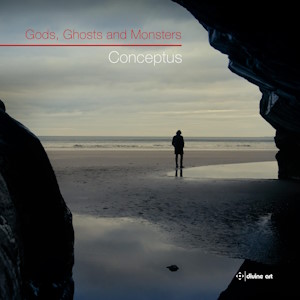
Gods, Ghosts and Monsters
Timothy Collins (b.1967)
Sea Song (2018)
George Butterworth (1885-1916)
Six Songs from A Shropshire Lad (1911)
Peter Warlock (1894-1930)
The Curlew (1922)
Gustav Holst (1874-2934)
Hymns from the Rig Veda, Op.24 (1907-08)
Frank Bridge (1879-1941)
Come to Me in My Dreams (1906)
When You Are Old (1919)
Love Went A-Riding (1914)
Scott Robert Shaw (tenor)
Conspectus
rec. 2021/23, Yoursonics Studio, Rijswijk, Netherlands
All works arranged by Timothy Collins
Divine Art DDX21133 [78]
This album owes its composition to Covid lockdown, a period when musicians were rethinking their approaches and when public concerts were largely impossible. Tenor Scott Robert Shaw worked with fellow Australian, composer Timothy Collins, to create new arrangements of British songs with accompaniment from a piano trio, one of German musicians and the other Dutch.
The three cycles are some of the most expressively powerful – and desolate in Warlock’s case – in the British repertoire from the first quarter of the twentieth-century. Not, I’m afraid, that you’d know it from these performances, which are executed with exquisite and studied vocal neutrality. Butterworth’s Six Songs from A Shropshire Lad was written for baritone and Shaw is already on dangerous ground as a tenor but his ethereal approach, gliding like a chorister over the songs, brings no insights. The effect is generally wan – Look Not in My Eyes – and though When I Was One and Twenty has slightly more engagement, the lack of vocal heft, nuance and descriptive power becomes increasingly wearying. One of the most beautiful postludes in all British song comes in The Lads in Their Hundreds but the combination of inert singing, and a salon-styled piano trio robs it of any consequence.
If musicians want to present The Curlew with piano trio accompaniment, then one needs to judge the results on that basis, though it’s surely legitimate to point out that ditching the cor anglais, flute and string quartet removes much of the timbral evocation that the cycle possesses. I’m afraid this was a very long 22-minutes for me. There is so little variety and so little colour and attention paid to linguistic subtleties in the Yeats’ poems that expressive width is reduced almost to nothing.
Holst’s Hymns from the Rig Veda, Op.24 are rarer on disc so it’s all the more frustrating that they are presented in this piano trio form and with a similar lack of expressive candour, with vocal production that bleaches white in places and comes under real pressure at times; sample Indra. I have heard quite a few recordings of Frank Bridge’s lusty Love Went A-Riding over the years but none that suggested that love sat in its cardigan, fast asleep.
The novelty is Collins’ own setting of Katherine Mansfield’s Sea Song, a study in loneliness and dejection, a ten-minute song of romantic isolation that rouses itself toward the end at the lines ‘I am frightened’ but otherwise is a little too circumspect to be really effective.
I’m sorry to be largely negative. The documentation is fine and there are full texts. However, if you are going to rejig the instrumental accompaniment to these songs it had better be for some purpose. Here, too much – too much of the time – is inert and far less than the sum of its parts.
Jonathan Woolf
To gain a 10% discount, use the link below & the code musicweb10



















